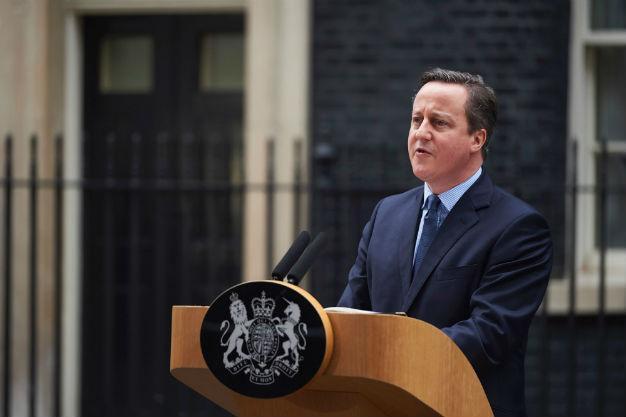Britain's Cameron to rally party on EU referendum
LONDON - Agence France-Presse

AFP photo
David Cameron will present parliament with a deal on EU reforms on Feb. 22, hoping to win support for his campaign to stay in the bloc after London Mayor Boris Johnson dealt a blow by backing a "Brexit".The British prime minister's speech follows Johnson's dramatic announcement on Feb. 21 that he will back the Leave campaign, despite Cameron having appealed for his support.
Cameron had secured the backing of the majority of his cabinet after striking a reform deal at a European Union summit on Friday to give Britain "special status" in the 28-nation bloc.
But following the announcement, six ministers, including Justice Secretary Michael Gove, said they would support a vote for Britain to leave the European Union.
Johnson, a popular figure seen as a contender for Conservative Party leadership, said outside his London home that Cameron's reforms did not fundamentally change the UK's relationship with the European Union.
In a column for the Daily Telegraph, he wrote that the European Union project had "morphed and grown in such a way as to be unrecognisable" and that there was nothing xenophobic in wanting to quit.
"We are seeing a slow and invisible process of legal colonisation, as the EU infiltrates just about every area of public policy," he said, adding that the vote was a once-in-a-lifetime chance to secure a new relationship.
Cameron now faces a battle to keep his centre-right Conservatives together while convincing voters he has secured a good enough deal from Brussels for them to support continuing membership.
However, Johnson's high-profile decision to oppose the premier has exposed divisions between pro- and anti-EU wings of the party.
While Cameron chose not to force his MPs to vote one way or the other, he has staked enormous political capital on the campaign to stay. Dozens of lawmakers have hinted or openly stated they will campaign to leave.
The Conservative candidate to succeed Johnson as mayor, Zac Goldsmith, has also said he will campaign for Brexit.
Many see Johnson's move as an effort to capitalise on anti-EU sentiment to build support for his own leadership bid.
"Boris goes in for the kill," read the Daily Mail's front page on Feb. 22, describing Johnson's move as a "dagger blow" for Cameron's campaign and claiming the London Mayor's support could be a decisive factor in a victory for the Leave camp.
The Daily Mirror wrote of an "uncivil war" within the Conservative Party over Brexit.
Anand Menon, a European politics professor at King's College London, told AFP that Johnson's endorsement would give the Brexit campaign "traction" but it was not yet clear how prominent his role would be.
"We have to wait see what the tone is going to be. There are two ways this can fall: a disagreement and back together afterwards, or it can turn nasty," he said.
Cameron's campaign has won crucial endorsement from political heavyweights like Home Secretary Theresa May, Foreign Secretary Philip Hammond and Defence Secretary Michael Fallon.
He also has the backing of backing of the City of London, Europe's biggest financial hub, and the main centre-left opposition Labour Party.
The bosses of around half of Britain's 100 largest companies including Shell, Rio Tinto and BT are to sign a letter in support of Cameron's campaign, the Financial Times reported on Feb. 21.
Cameron has defended his Brussels renegotiation by warning the country would lose power if it left the EU.
"Yes, of course if Britain were to leave the EU that might give you a feeling of sovereignty but you've got to ask yourself 'is it real?'," he said.
A Survation/Mail on Sunday opinion poll, the first since the Brussels deal, indicated that 48 percent of Britons did not want to leave the EU, 33 percent did and 19 percent were still undecided.
The pound dropped in Asian trading Monday as Johnson's move added to uncertainty over the country's future in the bloc.
















